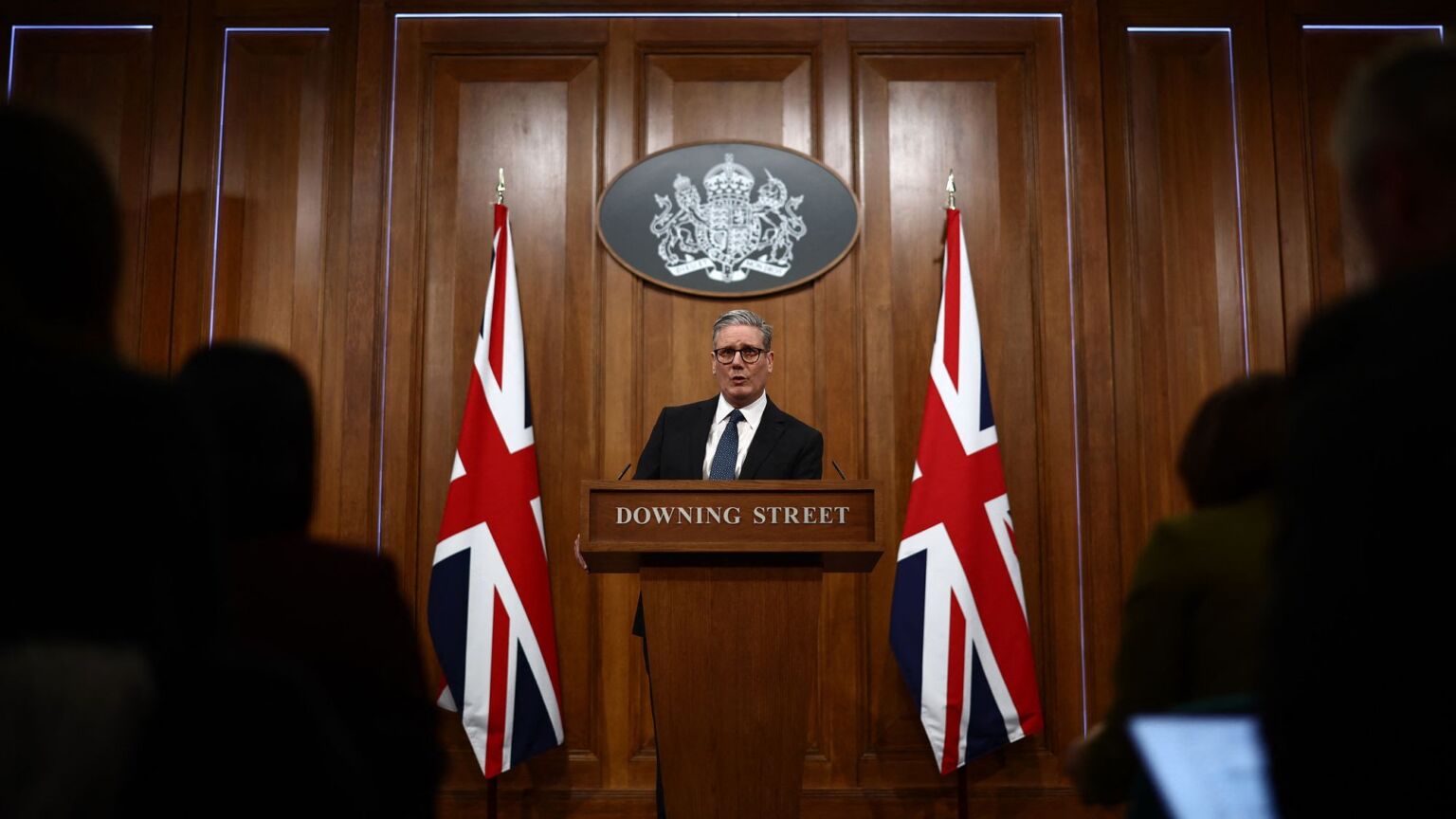How free speech became a victim of the Southport riots
The government’s crackdown on social media revealed the terrifying authoritarianism of our ruling class.

Want unlimited, ad-free access? Become a spiked supporter.
‘Think before you post.’ That was the message screamed out from government social-media accounts this time last year, as it desperately tried to quell the riots that erupted after the Southport killings, sparked by speculation the killer was a Muslim asylum seeker.
Today marks a year since that unspeakable horror – when Axel Rudakubana, the Cardiff-born son of Rwandan parents, walked into that Merseyside dance class, intent on killing as many children as he could. What happened next – the protests, the riots, the censorship – revealed a nation coming apart, and a government so dim and authoritarian that it looked upon scenes of hate-fuelled violence and instantly concluded that freedom of speech was almost entirely to blame.
And so, amid locking up the mix of racists, opportunists and thrill-seeking teenagers who inflicted so much carnage and fear on communities across the country, throwing bricks at mosques and trying to set hotels housing migrants on fire, the police also found time to go after those who had expressed despicable things online.
You will have heard of Lucy Connolly, the Northampton childminder who took to X in the wake of Southport to declare ‘set fire to all the fucking hotels full of the bastards for all I care’, earning her two years and seven months in prison. Less known is Tyler Kay, who received three years and two months for copying, pasting and posting Connolly’s tweet to his 127 followers. They were both convicted of ‘stirring up racial hatred’.
Fifty-three-year-old Julie Sweeney was given 15 months inside for ‘sending communications threatening death or serious harm’. ‘Don’t protect the mosques. Blow the mosques up with the adults in it’, she had posted, in a community Facebook group. Sweeney had never been arrested before, and was her husband’s primary carer.
Of course, threats or direct incitement to violence are not considered freedom of speech in any civilised nation, even the US. But the idea that Connolly’s, Kay’s or Sweeney’s rank little missives, muttered darkly into the digital ether, were both likely and intended to spark rioting and murder was a considerable stretch, and the hefty sentences meted out to them – eclipsing those for even violent crimes – were wildly disproportionate.
Even so, the arrests, prosecutions and convictions weren’t limited to those who appeared to call for – or more accurately, revel in – the violence that had already erupted. Lee Joseph Dunn, from Cumbria, was jailed for eight weeks for posting ‘grossly offensive’ memes, a crime under Section 127 of the Communications Act. They depicted Asian men, arriving on boats, with knives. ‘Coming to a town near you’, ran the lurid caption.
Those who witlessly shared false information also received a knock at the door. Bernadette Spofforth, a conspiratorial tweeter from Cheshire, was arrested on suspicion of ‘stirring up racial hatred’ and sending ‘false communications’. She had amplified that bogus claim that the Southport perpetrator was Ali Al-Shakati, a small-boats migrant on a watchlist. In the end, police took no further action, due to ‘insufficient evidence’.
Dimitrie Stoica, a Romanian migrant living in Derby, wasn’t so lucky. He landed himself a three-month prison sentence over a livestream in which he pretended to be fleeing from a far-right mob. In truth, there had been no trouble in the city that night. Still, the news that lying for attention on social media is a crime no doubt sent shivers down the spines of the nation’s influencers.
This crackdown won’t have surprised anyone who had been paying attention. For 60 years, Britain has been engaged in a foolhardy experiment in policing hate, offence, misinformation – as if any of these concepts can be neatly, objectively, defined. Alongside acid washing your social-media feeds, as users discovered to their horror this week, the 2023 Online Safety Act also brought in a new ‘false communications offence’ that caught out Stoica and – very nearly – Spofforth.
But it would be naive to say all of these cases were simply about the criminal-justice system applying the law without fear or favour. From the top of government, the message rang out that riots-adjacent hate-speakers would be made examples of. Connolly received a longer sentence than Philip Prescott, an actual Southport rioter, who helped menace the local mosque. Since then, she has been denied release on temporary licence, reportedly due to ‘media interest’ in her case.
Entirely innocent people, who had said nothing inflammatory or hateful, were caught in the riptide, too. Take Jamie Michael, a former Royal Marine from the Welsh valleys, who was arrested, held in custody for 17 days, sent home on a tag, and all for a Facebook video after Southport in which he called for a public meeting to discuss the threat posed by illegal migration and the need for security at parks and schools to protect children. If he wasn’t one of the few Southport speech criminals who pleaded not guilty, he’d probably still be inside now. In the end, with help from the Free Speech Union, he was acquitted by a jury in just 17 minutes, one for every day he had been in a jail cell. Apparently, his cup of tea hadn’t even had a chance to cool when he and his legal team were rushed back in for the verdict.
There are no doubt many more Jamie Michaels who we do not know about. The UK is investigating more people for speech crimes today than America did during the First Red Scare. At least 30 people are now arrested each day for ‘grossly offensive’ speech under the Communications Act and the Malicious Communications Act. And those are just two pieces of censorious legislation, among a groaning bookshelf of them.
Naturally, having demonstrated the full gamut of its censorious powers post-Southport, Labour now wants to go further. There has been talk of making the Online Safety Act even more dystopian, by reviving provisions forcing Big Tech firms to remove ‘legal but harmful’ speech. A working group is drawing up a definition of ‘Islamophobia’, to be imposed on government bodies. Having apparently concluded that Britain’s increasingly agoraphobic coppers don’t spend enough time scouring social media, there are even plans for a new ‘elite team of police officers’ to monitor anti-migrant online sentiment. What could possibly go wrong?
After Southport, there was some ridiculous talk on X that Britain had gone the full North Korea: that Keir Starmer had established the world’s first personalist dictatorship without the merest whiff of a personality. But that doesn’t mean what we are actually contending with is any less chilling. We are ruled by people who see censorship as all that stands between civilisation and barbarism. Who see freedom of speech as the root cause of riots and racism, rather than the means through which you can challenge prejudice and salve tensions in society.
This is a recipe not only for ever-more authoritarianism, but also for more of the fear, division and distrust that are already pulling at the threads of a fraying society. Think before you post? Think before you censor!
Tom Slater is editor of spiked. Follow him on X: @Tom_Slater
£1 a month for 3 months
You’ve hit your monthly free article limit.
Support spiked and get unlimited access.
Support spiked – £1 a month for 3 months
spiked is funded by readers like you. Only 0.1% of regular readers currently support us. If just 1% did, we could grow our team and step up the fight for free speech and democracy.
Become a spiked supporter and enjoy unlimited, ad-free access, bonus content and exclusive events – while helping to keep independent journalism alive.
———————————————————————————————————————————–
Exclusive January offer: join today for £1 a month for 3 months. Then £5 a month, cancel anytime.
———————————————————————————————————————————–
Monthly support makes the biggest difference. Thank you.










Comments
Want to join the conversation?
Only spiked supporters and patrons, who donate regularly to us, can comment on our articles.